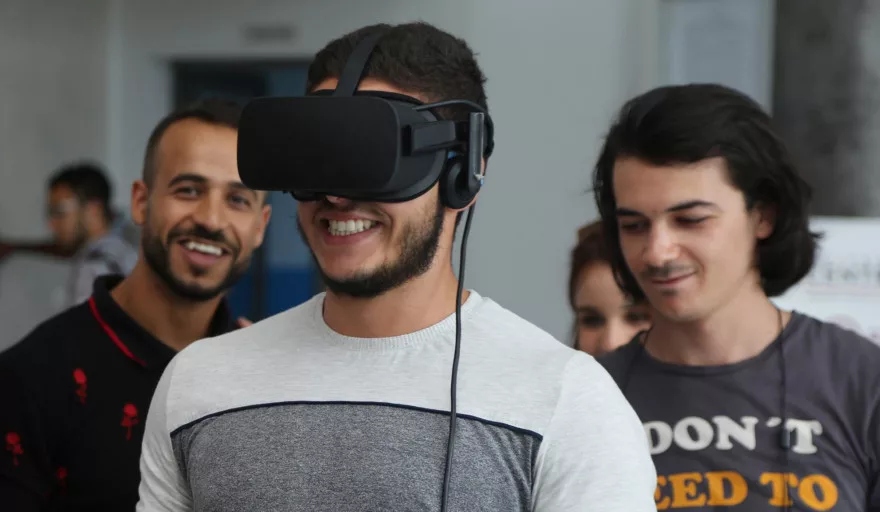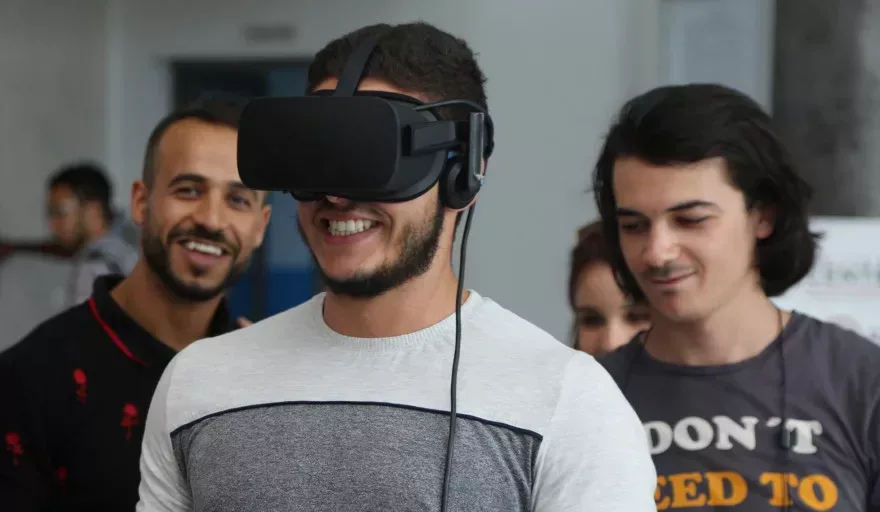
Adaptive Education
We take a look at Honoris United Universities’ latest technologies and investments in the field of digital education, and speak to CEO Jonathan Louw about their impact on the future of learning in Africa
Writer: Marcus Kääpä
Education for impact – this notion is the heart and soul of Honoris United Universities (Honoris).
Committed to the transformation of society through learning and empowerment, Honoris is the largest pan-African network of private higher education institutions paving the way for the growing future generations of experts, leaders, and professionals. The organisation’s broad and overall goal is to prepare world-class African talent with 21st century skills to develop and thrive in the new world of work.
“’Education for impact’ is something we firmly believe in,” begins Jonathan Louw, CEO of Honoris. “It represents our vision and mission, and it is one that our staff and faculty live every day. What it is at the root is a commitment to educating and preparing future leaders which we believe will contribute to the transformation of the continent.”
Honoris has a significant footprint across Africa. The organisation is situated in several locations, such as Morocco, South Africa, Nigeria, Tunisia and many more, supporting a community of over 61,000 students.
“We have adopted a really entrepreneurial approach with various collaborative universities and institutions contributing to the impactful vision that we have,” Louw says. “Although it may be a cliché term, we have adopted Industry 4.0 across the organisation. Honoris has adopted a number of innovative techniques surrounding adaptive learning, augmented reality, or virtual reality (AR/VR) and simulation – particularly when it comes to the medical sciences – that enables students to learn to their full potential, especially during this COVID-19 period.”
This acceleration in adopting the latest technologies and tools to maximise digital learning potential is aimed to equip Honoris’ students with the cultural agility and mobile mindset that is demanded in today’s fast-paced and increasingly digitalised jobs and start-up markets.
Digital education
Since the multi-faceted international impact that dawned in the wake of the COVID-19 pandemic, communication, education, and business operations have dramatically shifted towards a heavily digitalised environment out of both necessity and a catalysed natural facilitation of means. The ability to access and implement the latest hard and software, coupled with increasingly improved online connection, has allowed the realm of education to be moved online; an aspect of life that everybody has had to get used to.
“Despite the challenges of the pandemic, it has been quite amazing to witness the fast-tracked nature of IT strategies in many different forms,” Louw reflects. “We were quite well prepared for this. Honoris had already blended the digital world into our operations through platforms that we had built in our institutions such Mancosa and Regent in Southern Africa. We have been, and still are, committed to making access to digitalisation across the entire student journey.
“What is really interesting is that we saw a strong appetite in the students for a digitalised environment within the enrolment process. Where we previously believed that face-to-face meetings and open campuses would prove the most popular, virtual open days, digital co-working spaces and online faculty interactions engaged them – quite literally. So, in this sense, COVID-19 has allowed us to unlock the potential of the digital realm for student enrolment and education.”
Considering this, Honoris is planning to strengthen its enrolment and employability strategy with digital services, such as the launch of career centres that are a mixture of virtual and physical spaces.
Collaboration for education
“We have also made multiple recent exciting partnerships with external organisations,” Louw tells us. “Through our partnership with Le Wagon we are seeing the opening of coding bootcamps across the continent. Le Wagon will help us establish new Honoris presences in many communities, and we have begun with Mauritius and Morocco; two launches that we believe have been very successful.”
According to Louw, these coding bootcamps are to be particularly intensive programmes that are available as full-time or part-time courses, following a nine or 24-week process. The course will offer opportunities to mature students or those in entry-level positions to gain traditional digital skills, and even potentially pave the way for entrepreneurship through coding skills. The course will also give these students an internationally recognised certification, making them future-fit with a greater level of employability, not just in Africa, but also across the globe.
Another partnership recently announced is with Area9, a world leading company in developing and implementing personalised adaptive learning platforms within the education sector. The personalised nature of this platform engages students on a greater level by helping eliminate boredom and frustration; common aspects of a lecture that a student may face.
“The Area9 adaptive learning platform is an incredible tool, and it is a great leap forward in what we are trying to achieve,” Louw elaborates. “Higher education is undergoing a fundamental reorganisation, with a pivot towards new learning systems that accelerate and improve skills acquisition. We were therefore delighted to partner with the Area9 Lyceum’s Rhapsode™ adaptive learning platform to create a personalised learning approach that is critical for improving the outcomes of our students.”
EON Reality
In its continued commitment to academic innovation across the continent, Honoris has announced the roll-out of its first pan-African augmented and virtual reality platform in partnership with California-based world leader, EON Reality.
“Honoris has started this in Morocco, and we are embracing this across the rest of the platform, which is part of our commitment to invest in academic innovation and the exploration into new methods of delivery with a strong focus on student success,” Louw says.
EON Reality will provide a wealth of opportunities in the education sphere. From VR goggles used by students of architecture to virtual learning for surgery training, there is large potential for the technology. Students will have the opportunity to experience virtual field trips, undergo simulated lab exercises, emulate real-life building projects and more to enhance the learning experience and further increase job preparedness.
“Honoris institutions are united in developing sustainable academic models that are future-oriented and employability-focused,” Louw adds. “I am proud of all the efforts deployed by our faculty to develop strategic partnerships in Africa and across the globe to enhance both student experience and student outcomes”.
Honoris is committed to creating transformative impact in education across Africa by remaining at the forefront of academic innovation, finding in EON Reality a perfect partner to prepare world-class African talent.
“The intrinsic cross-pollination between our institutions helps foster and scale academic innovation and collectively re-imagine education to prepare world-class African talent,” Louw explains.
By leveraging the latest technology and innovative partnerships in the field, Honoris has been able to implement a transformative impact across the education sector of Africa. With a focus on the continued growth and expansion of the Honoris network across the continent, Egypt, Kenya, Ivory Coast and Senegal are each a location of future prospective development for the organisation. Supported by dedicated employees led by the drive to promote ‘education for impact’, a promising future awaits Honoris and those it helps learn.



























